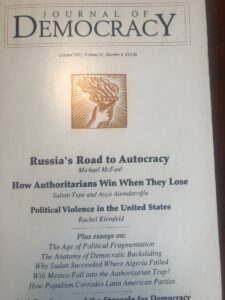
Credit: International IDEA
The European Union’s executive said on Tuesday that Turkey’s bid to join the bloc had “come to a standstill” amid serious democratic shortfalls, in its most critical annual report since Ankara began membership talks 16 years ago, Reuters reports:
The European Commission said President Tayyip Erdogan’s government had overseen a continued erosion of democracy and the rule of law and had ignored the EU’s recommendations last year. The report also suggested for the first time that Ankara was no longer serious about delivering on EU-backed reforms, even though Erdogan recommitted in April to the goal of full EU membership as both sides tried to improve relations.
“The EU’s serious concerns on the continued deterioration of democracy, the rule of law, fundamental rights and the independence of the judiciary have not been addressed. There was further backsliding in many areas,” the Commission said.

ICDR Statement on the recent anti-democratic actions in Tunisia
Similarly, the International Coalition for Democratic Renewal (ICDR) is “deeply concerned” about democratic backsliding in Tunisia, citing the recent anti-democratic actions and decisions of President Kais Saied.
The world’s democracies, including the United States and the European Union and its member states, should insist that the Tunisian government end this “exceptional” detour, and they should condition future economic assistance on the restoration of democracy and the re-opening of the parliament, it insisted.
A concerning trend of democratic backsliding has taken place in recent years, as governments gradually shift away from their democratic ideals and slip closer toward authoritarianism, notes a recent analysis in Science.
How do duly elected rulers weaken checks on executive power, curtail civil and political liberties, and undermine the integrity of the electoral process?

Credit: @WilliamJDobson
Democratic backsliding is the incremental erosion of institutions, rules, and norms that results from the actions of duly elected governments, Stephan Haggard and Robert Kaufman write in the Journal of Democracy. Drawing on sixteen cases of backsliding from Latin America, Eastern Europe, and Africa as well as the United States, they describe the anatomy of democratic backsliding in terms of three interrelated causal factors:
- First, social and political polarization contributes to government dysfunction and lack of trust in institutions, and it increases the risk that incumbent parties will move toward extremes or that new antisystem parties will gain traction.
- Second, the effect of polarization on back-sliding will depend on whether would-be autocrats can capture the executive and then whether they manage to gain the legislature’s support for or acquiescence to the concentration of their authority. Ironically, pliable legislatures play a key role in a process that we call the “collapse of the separation of powers,” which provides the political foundations for assaulting other features of the democratic system.
- Finally, democratic backsliding is incremental in nature, which provides tactical advantage to incumbents. The gradual subversion of democratic institutions allows incumbents to slowly accrete powers, making the process difficult to detect and counter until it is too late.
 The advanced industrial democracies must place a higher priority on defending democracy as a key foreign-policy objective, add Haggard and Kaufman, authors of Backsliding: Democratic Regress in the Contemporary World. And any initiative to establish a formal or informal alliance of democracies must make the defense of democracy itself a common priority. RTWT
The advanced industrial democracies must place a higher priority on defending democracy as a key foreign-policy objective, add Haggard and Kaufman, authors of Backsliding: Democratic Regress in the Contemporary World. And any initiative to establish a formal or informal alliance of democracies must make the defense of democracy itself a common priority. RTWT
There is no universal pattern of how democracies erode. They all do it differently. Hence, it’s important to understand the different historical contexts of each country, says Dr. María Isabel Puerta Riera, author of the book Crisis de la democracia: ¿En el umbral de la posdemocracia? (The Crisis of Democracy: On the Threshold of Post Democracy?).
“We have to become excited about democracy to protect it,” she tells Pedro Graterol of Caracas Chronicles. To defend democratic norms, Puerta argues that we “have to reward good behavior, but also punish behaviors outside of the rules and norms of the system.”
This Is How Democracies Die in the 21st Century https://t.co/1hOrTAPCAE via @CaracasChron
— Democracy Digest (@demdigest) October 20, 2021







